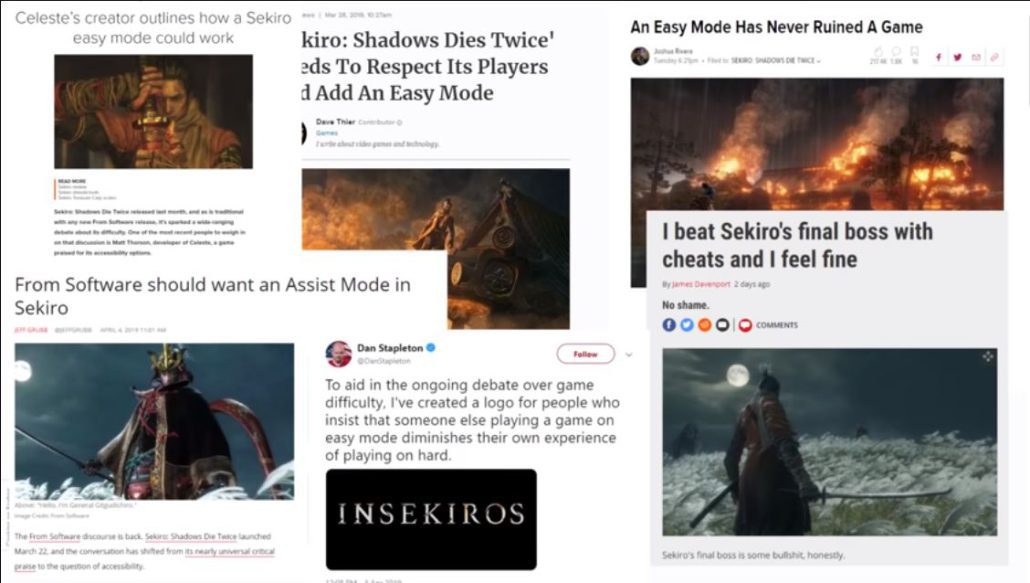Dark Souls Doesn’t Need an Easy Mode, and Neither Does any Other Game (مقاله برای استودیوی بازیسازی پولیدین)
At the risk of sounding like an elitist and a gatekeeper, I’m here to explain why Dark Souls doesn’t need an easy mode. Dark Souls is being mentioned because it has become the ultimate talking point regarding the “difficulty setting” discussion. But this is not just about Dark Souls. It’s about every other game out there. Neither one of them needs an easy mode. This goes to all the people out there who say they just play games for their story and don’t wanna deal with hard challenges. Well, here’s my two word response to you: screw you. We don’t do that shit here. Gaming is where REAL men test their mettle. If you want to blow off some steam after a hard day’s work, go watch a movie or something.
Although who am I kidding. I know who’s behind pushing this nonsense. It’s all those game journalists who have to review every new game in one week and can’t be bothered to repeat the same section 10 times because it was too damn hard and they have to deliver the review by Monday. I understand your pain, but either git gud or switch to covering game news. Don’t ruin it for the rest of us.

When discussing whether including easy mode in games is a good idea, there are three schools of thought:
- It’s a good idea for all games
- It’s a bad idea for all games
- It’s a good idea for some games
Ratatoskr, a Youtuber who has made a lengthy video about this topic, made a poll asking his audience this question:
As you can see, the radicals are in the minority. Most people have the reasonable stance that some games benefit from having a difficulty setting, while some don’t because being difficult is part of their intended experience. That’s the stance of Ratatoskr’s video too.

But as it happens, I am in the unreasonable minority. I believe that difficulty settings and easy modes are a fundamentally bad idea, and the reason for that is not some fascistic ideal about excluding noobs from the eternal glory of finishing games but a concern for the game design itself. How and why? Let me explain.
Difficulty Settings Make the Game Inherently Less Exciting
When making a game, you want the player to have a certain kind of experience. This experience includes a lot of ups and downs that actually make some parts of the game memorable. For example, the fact that I was stuck on Black Dragon Kalameet for 8 hours in Dark Souls makes that fight memorable for me. The fact that I could defeat Pinwheel in 10 seconds also makes that fight special, but for a different reason. (the reason being laughing at Pinwheel for being a wimp).

The fact that players get stuck in certain areas and bosses is what creates memories for them. And overcoming these obstacles is exactly the experience that makes people talk about the game with glee for years to come. This is so effective that having a boss or an area relatively harder than most bosses and areas in the game could be a narrative device.
Difficulty setting completely destroys this aspect of the game experience because it creates a homogenous predictable experience from start to finish. No parts will stand out if the whole game is consistently easy, hard, or in-between. In perfect game design, easiness should not be something you choose but something you achieve by skill, knowledge, and experience.
Difficulty Settings Make the Player Make a Vital Decision Without The Necessary Knowledge to Make It
When you are booting up a game for the first time, you have no idea how challenging the game is. So when a game asks you what difficulty setting you to choose, you can’t make an accurate decision based on anything. You might select easy, even though normal is completely doable for you. You might choose hard but not realize “hard” in this game is much more than you can handle.
And the thing is that you might not even realize this in the beginning. You might find out you didn’t choose the right difficulty setting when you are too far gone.

Some games allow you to change the difficulty any time you like, but that completely trivializes any challenge the game offers. You might as well make all games like Prince of Persia (2008), in which the main character cannot die because his sidekick saves him every time.
Basically, the existence of difficulty settings creates a constant state of frustration for the player: if you choose hard or normal, every time you get stuck, there’s this constant temptation to decrease the difficulty so as not to deal with frustration, but if you do that, you feel like a coward and a chump for giving in as soon as you faced adversity.
I am not against unlocking different difficulty settings once the player finishes the game for the first time. Because by then, they’ll have a clear idea of how challenging the game is. But when you are playing the game for the first time, you are not eligible to decide about something that would impact the rest of your experience without having a clear vision of what it entails.
To save the player from making such a choice that has so much potential for causing frustration is a blessing in disguise.
Difficulty Settings Result in Lazy Balancing
Balancing in games is an art that requires many iterations to master. This is why From Software games are so revered because despite having the reputation of being hard, they are not stupid hard. They can actually become surprisingly easy if you get the hang of them.
Some developers don’t want to go through the grueling process of balancing a game’s difficulty to perfection. So they cop out and leave the responsibility to the player. To avoid criticism like “the game is too easy” or “the game is too hard,” they just put a slider in the game that either makes the game stupid easy or stupid hard. And you can’t complain anymore, because you chose that.
Now I can tolerate difficulty settings that make the AI dumber or smarter, but most of the time, that’s not the case. The difficulty only modifies the damage you take and the damage you deal. This is such a shallow outlook to have about the concept of challenge. Turning enemies into damaged sponges and the player into a glass cannon doesn’t provide a satisfying experience. It just wastes the player’s time and causes frustration.

One of the appeals of video games is to have nerdy conversations with other people regarding the shared experience of your favorite games. This is why From Software games attract such a vibrant community because everyone in it finally gets what it feels like to defeat Ornstein & Smough. The Resident Evil community knows what it feels like to be hunted by Nemesis. The Legend of Zelda community knows what it feels like to be stuck in the Water Temple level in Ocarina of Time. The Cuphead community knows what a pain in the ass that bee boss was.


I specifically mentioned Resident Evil 3 and Cuphead because both games have a half-assed easy mode that even the game itself doesn’t count as a proper playthrough. If you play these games on easy mode, you don’t get access to the ending.
They are good examples that show how important it is for some developers to provide a “definitive” experience of their game, to the degree that they are not even willing to give legitimacy to this so-called “easy mode” that they were probably forced to include in their game due to the fear of backlash.
The main reason developers include this setting is a lack of confidence. They are not sure if they’ve got the balancing right; they’re not sure if the players will get engaged with their game; they are afraid of being called elites and gatekeepers. So at some point, they chicken out. The lack of difficulty settings on the first playthrough is a mark of confidence that very few people in the volatile video game industry have. I am eternally grateful to From Software and Hidetaka Miyazaki because they had this confidence when no one had it. And infused the game industry with it.
Difficulty Settings are Based on a Fallacy
And that fallacy is: “It doesn’t hurt you. Why don’t you want people to enjoy the game how they like?”
The first fallacy is that “it doesn’t hurt me.” As I said, the inclusion of difficulty hurts the game (and by extension, me as a player) in a number of ways. It puts the player in limbo in which they don’t know which option to choose; it puts you in a psychological mindset in which you shift from temptation to guilt, and it denies you of a shared experience with every fan of the game. It also messes up the balancing on the developer’s part.
The second fallacy is that this statement assumes that people actually know what they like. That’s not always the case. Ratatoskr discusses this point in detail in his video, but I think a personal example he brings is illuminating.
He said that he played The Elder Scrolls III: Morrowind after playing The Elder Scrolls IV: Oblivion. Morrowind is a much less accessible game compared to Oblivion. The graphics look weird, you can’t fast travel anytime you like, and pathfinding is done through reading road signs and following in-game clues. At first, he disliked this and abandoned the game. But due to the peer pressure from his friends who loved the game, he kept going.

At some point, as he was following directions to a quest, he started to appreciate the graphics more because he was absorbing the visuals to find his way in this strange world. As he walked around while the music was swelling, something kicked in; suddenly, he “got” the game. He was immersed. He fell in love with the experience.
As you can see from this example, sometimes people don’t know what they want. Deep down, they might crave something bold and new, but since they have never experienced it, they can’t tell that they have this craving. So they might stick with tried and tested formulas, never knowing that a better experience is waiting for them.
Feeling frustrated is not always a bad thing. Sometimes it’s caused by the brain’s exposure to something totally new, something that could become your new favorite thing or open the door for new possibilities. But you might never experience that feeling if the game developer doesn’t push you in that direction. There has to be some force involved.
The truth is that many game devs sacrifice the potential of their game because they think it will lose its potential audience. But the irony is that the opposite is true. The more a game asks you to pay attention to it, the more likely the player will find the will to do so if the game is worthy of attention. The more you try to accommodate the player, the more likely he/she is to zone out because the human mind is very good at detecting desperation of any kind.
What are the Alternatives?
Am I advocating for all games to be hard? Absolutely not. I am advocating that the first playthrough of every game – on a base level – should have the same difficulty for everyone, whether it’s going to be hard or easy or whatever in between.
So, how can we cater to different skill levels without adding difficulty settings?
There are a couple of ways to do that, like:
- Adding a build/playstyle/class that is a bit more overpowered than others so that it can act as a secret easy mode within the confines of the game itself. The Sorcerer and Pyromancer class in Dark Souls is usually considered “Dark Souls’ Secret Easy Mode.”
- Dividing the game world into different difficulty levels allows the player to choose which one to engage with freely and when. This method works for open-world and semi-open-world games. The most prominent example is The Legend of Zelda: Breath of the Wild.
- A straightforward main campaign with manageable difficulty and more challenging side content or end-game content for the more advanced players. Super Mario games do that.
- Having a gameplay mechanic rewards the player for skill and game knowledge but doesn’t punish the player for lack thereof. The combo grading system in Devil May Cry and the performance grading system in the Hitman series are examples of that.
- Making achievements act as an unofficial “hard mode.” (Although I don’t like this one. Achievements can become anti-fun really fast if you care about them, at least on the first play-through).
- Using a dynamic difficulty setting that secretly becomes easier or harder depending on the player’s performance, like Resident Evil 4. This solution hurts the “shared experience” part, but it saves the player from making an uninformed choice.
- Cheat codes! Yes, I am against using them, but if someone REALLY doesn’t care about being challenged, they can use cheat codes. The difference between cheat codes and an easy mode is that first, you have to go out of your way to find cheat codes, so it’s a 100% informed decision, and second, cheat codes, by their very nature, indicate this is not how the game is meant to be played and everyone involved knows that. Also, cheat codes can be used by people with impairments and disabilities.
Apart from the alternatives mentioned, you can find other possible solutions that suit your game’s context.
About Accessibility Options
I understand that accessibility is one of the huge talking points in this field, and there’s an ever-increasing attempt to make games accessible for the colorblind, those with visual or hearing impairment, etc. This is a great thing, and I am 100% behind it. However, I like to quote Youtuber NeverKnowsBest, who, in this video, sumps up this issue perfectly:
Everyone wants games to be more accessible for disabled players. We’re all in agreement that this is a good thing and that accessibility is a problem, but it’s not a simple problem and mandated easy modes aren’t some magic fix-all solution. There will always be elements of game design that can exclude some players. If a game uses any audio indicators, then it excludes people with hearing impairments and if a game uses any visual indicators, then it excludes people with visual impairments. That doesn’t mean we need to force games to stop using these things.
The unfortunate reality is that all design choices face the risk of excluding someone and that’s not something we can just eliminate, but what we can do is make different games and create different experiences and praise games which are different, which do take risks, which try to break the mold. Not every game can appeal to everyone and not every game can be inclusive to everyone. These things are unachievable, but what we can do is ensure all games aren’t the same, so that people with different tastes and different needs have at least some experiences that are for them.
Published on:
Polydin Studios Blog






















اینا هم هوش مصنوعی ان؟
نه مقالاتی که کلاً با هوش مصنوعی نوشته شده باشن رو اینجا نمیذارم. اینو کلش رو خودم نوشتم. از بین مقالاتی که تا حالا اینجا منتشر شده فقط the importance of concept arts in video game development و how character design shapes your experience هستن که با کمک هوش مصنوعی نوشته شدن (ولی فقط با کمک هوش مصنوعی؛ نه کلاً با هوش مصنوعی).